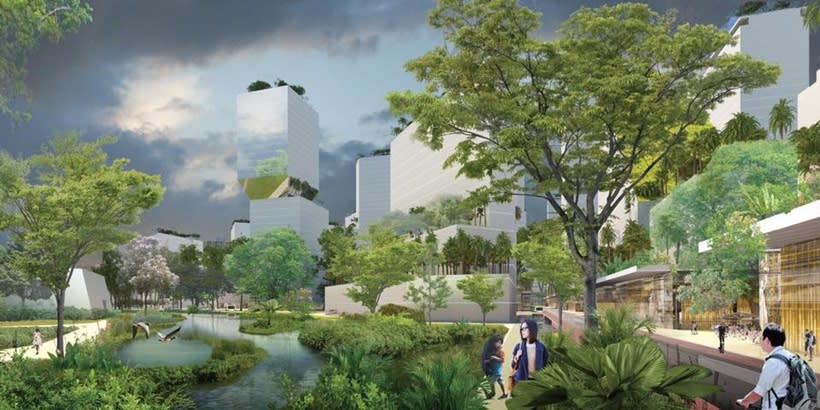3 reasons why scrapping the HSR project may be bad for Jurong
Artist’s impression of the HSR terminus in Jurong East.
The growth prospects of Jurong’s property market may have dimmed after Malaysia’s new Prime Minister Dr Mahathir Mohamad on Monday (28 May) said a “final decision” was made to scrap the Kuala Lumpur-Singapore High Speed Rail (HSR) project.
Both countries had previously signed a bilateral agreement in 2016 to undertake the 350km mega project, with Jurong East earmarked as the location of the Singapore terminus. The HSR was expected to reduce travel time from Singapore to KL to just 90 minutes.
But the new Malaysian government plans to cancel the project, which Dr Mahathir said would cost RM110 billion (S$37 billion), amidst a whopping debt of over RM1 trillion (S$337.9 billion) worsened by the 1MDB corruption scandal.
The decision could impact Singapore’s ambitious plans for Jurong’s future. Here’s why:
1. Impact on property prices
Construction of the new terminus in Jurong was expected to boost property prices in the area. Prices are unlikely to increase as quickly as expected following the announcement, experts told TODAYonline.
“Those who bought property in Jurong with the purpose of investment would be disappointed as their investments might only bear them good gains many years later,” said Ku Swee Yong, CEO of International Property Advisor.
Construction of the HSR was supposed to start later this year, with the first trains running by 2026.
But ZACD Group executive director Nicholas Mak argued that the health of Jurong’s property market does not depend on the HSR. Among the reasons for this is that the upcoming Jurong Lake District has been designated as Singapore’s second Central Business District.
“The region has its own attractions such as the MRT interchange, new Jurong Region Line, shops, offices and business park that provide jobs and services… all these come about without the HSR,” he said.
Interested in buying property in Jurong? Check out our step-by-step guide to buying a condo.
Artist’s impression of the future Jurong Lake District.
2. Effect on commercial activity, land bids
Those who invested in commercial properties or have shops in Jurong are advised to factor out the influx of Malaysian workers and tourists now that the HSR has been scrapped.
“Others who might have invested in small retail units, and are banking on the day trippers from Malaysia to boost sales may have to adjust their sales expectations drastically,” noted Ku.
While experts believe that plans for residential and commercial projects in the vicinity are unlikely to be revised as these were conceptualised prior to the HSR plans, they think property developers are more likely to adopt a conservative approach when bidding for land sites.
“Developers will be a lot more careful and less aggressive with their bid price going forward,” said Ku.
Chris Koh, director of property consultancy Chris Koh International, added that property developers should no longer leverage on the HSR. “If I’m a developer, I will not be banking on it to market property anymore, but I would rather sell the other merits of Jurong such as the Jurong Lake District and other amenities in the region.”
Did you know that Jurong was once infested with crocodiles? Learn more about how Jurong East has developed over the years.
3. Some missed opportunities
The HSR project was forecasted to create a total of 111,000 jobs and add RM21 billion (S$6.7 billion) to the economies of both countries.
“This will be a huge setback as lowering transport and connectivity costs would boost trade and increase the flow of talent both ways,” said Maybank senior economist Chua Hak Bin.
While transport experts said the HSR is a “good thing to have” as it will significantly reduce travel time between Singapore and Kuala Lumpur, its scrapping is unlikely to have a significant impact on Singapore’s own rail network.
“The project was never about expanding travel capacity between the capitals, it was about providing a better travel option than air and road,” said Walter Theseira, a transport economist at the Singapore University of Social Sciences.
“I doubt our rail projects like the Jurong Region Line will be affected as our MRT plans are not conceptualised to hinge on the HSR,” he noted.
Romesh Navaratnarajah, Senior Editor at PropertyGuru, edited this story. To contact him about this or other stories, email romesh@propertyguru.com.sg




